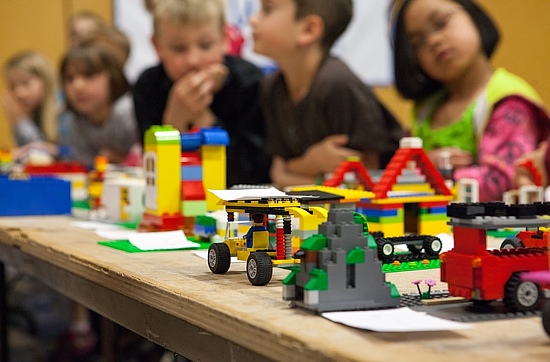Butchers, bakers, and candlestick makers
STEM programming and the Maker movement are pushing the importance of designing, building, and creating anything and everything. But where do you (and your kids) start?

If you’ve tuned into current academic conversations, you might have heard people talking about “STEM.” STEM is programming that emphasizes Science, Technology, Engineering, and Mathematics. Connected with STEM is the Maker movement– that is, the movement aimed at getting young and old people into making things. Making isn’t limited to computer coding/hacking either, although that’s a focus that’s often spotlighted. The Maker movement spans across a huge variety of skills and includes things like sewing, quilting, knitting, woodworking, brewing, tinkering, glassblowing, LEGO robotics, cooking and baking, and…what’s the word for making things on a pottery wheel…potting? Pottery-ing? Anyway, the Maker movement includes just about anything you can think of.
But maybe you don’t want to lug a kiln into your house to become a potter right this second. Or maybe you’re looking for a way to get your child involved, but you aren’t quite sure where to start. What are some ways to get involved, either on the outskirts in a just-looking-around capacity, or in a dive-into-the-deep-end approach? Why, I’m so glad you asked!
— ∮∮∮ —
1. Attend RVA MakerFest!
This event takes place on Saturday, September 27th at the Science Museum of Richmond from 10:00 AM to 5:00 PM, and it’s gloriously free. There are SO MANY different makers attending this fest, it’s a little mind-blowing–robotics teams, indie presses, libraries, chocolatiers, brewers, computer programmers, and more. If there’s a maker-craft you’re interested in, it’s probably represented at RVA MakerFest.
— ∮∮∮ —
2. Join (or mentor) a FIRST LEGO League team
When I first started researching FIRST LEGO Leagues for my job (I have a great job!) I was very impressed with the goals and techniques these clubs use to teach kids not only STEM and maker skills, but things like “gracious professionalism”, too. These clubs require a lot of commitment both from members and mentors, so if you’re looking for something hardcore boasting pretty convincing evidence of positive impact on participants,1 this might the activity for you.
— ∮∮∮ —
3. Visit your local library
More and more libraries are creating “MakerSpaces” in an effort to further the goal of providing a place for all kinds of learning to take place in communities. Some have robotics teams while others may have more old-school tools like sewing machines. Each one is a little different. And, of course, you can find books on tons of DIY topics there, too. Keep an eye out for the MakerSpace trend to continue.
— ∮∮∮ —
4. Become a 4-H volunteer (or get your kids into it)
Yes, 4-H! It’s not just for rural kids, and it’s not just about animal husbandry and home-ec! The Virginia Cooperative Extension explains that “you can share your expertise to provide young people with learning opportunities as varied as rocketry, GPS mapping, public speaking, agricultural science, photography, community service, and so much more.” Rocketry, folks!
— ∮∮∮ —
5. Learn to code
Designing digital stuff is a form of making, too! I’ll be the first to admit that my HTML skills were learned on the Lord of the Rings Netscape message boards2 and LiveJournal, and those skills are sad and laughably limited, but Codecademy has been a stepping stone in getting me to at least take some baby steps. Codecademy is a site designed to teach people (young and old alike!) the basics of computer coding through short exercises that get more and more challenging as you go. Or if you’re looking for a locally-based, meatspace option, codeVA offers after-school pograms billed as “like ballet for the brain”–sounds pretty impressive to me. They also boast an upcoming robotics program. Finally, if you’re like me and coding languages seem like Greek, I suggest trying out the book Hello World! Computer Programming for Kids and Other Beginners (available at VCU’s Cabell Library and Chesterfield County Public Library, among others).
— ∮∮∮ —
And just because I’m feeling generous, I’m going to throw in a bonus for you:
6. Ask your grandma
If you’ve got a grandma (or grandpa, or someone with sage wisdom from the days of yore) chances are, s/he knows a thing or two about making things. Ask! In fact, that single word is probably the number one way to start learning how to make something: ask someone to teach you! Just ask! Ask!
Photo by: Walla Walla University
-
Recommend this
on Facebook -

Report an error
-

Subscribe to our
Weekly Digest





There are no reader comments. Add yours.